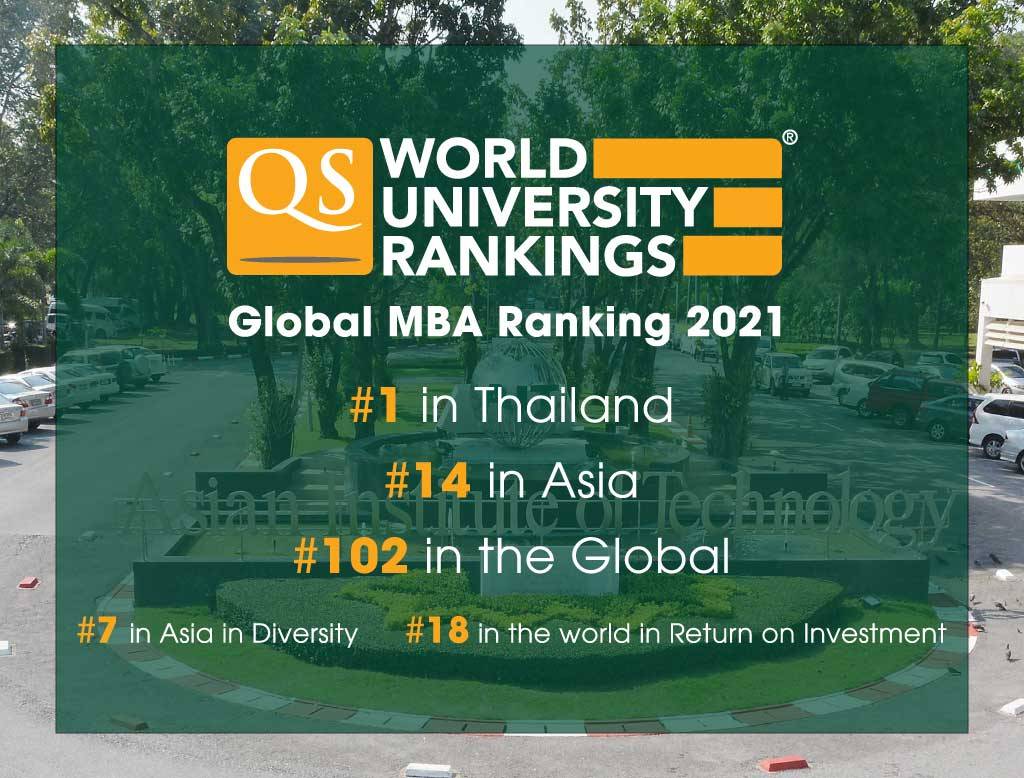Academic Programs
EMBA Program
MESSAGE
FROM THE DEAN
The AIT EMBA Program was established in 1996, with specialisations in international business and technology. We are re-launching the program to build upon one of our unique strengths, namely our significant history and presence across Asia, and particularly the ASEAN region. EMBA, MBA
The EMBA has long attracted students who now work in senior positions across many businesses, governments and non-governmental organisations from Vietnam, Myanmar, India, Pakistan, China, Japan as well as Thailand. The program has a flexibility that allows for limited time away from the office and includes up to forty different courses taught across an eighteen-month period. There are also opportunities to participate in international study weeks around the world. The faculty teaching this program are rated as outstanding; they mingle practical experience in the workplace with a proven ability to teach at an executive level.
I very much welcome your interest in the program and hope to see you in program of the Executive Master of Business Administration . Most of our classes take place at our campus in Hanoi, Ho Chi Minh city and Thailand. EMBA, MBA

Why the AIT
EXECUTIVE MBA?
Develop your ASEAN and broader Asian network
AIT has 24,000+ alumni spread across Asia. This EMBA is especially focused on those managers, directors and companies who want to broaden their network across ASEAN.
World-class Faculty who have considerable pan-Asian experience
The program, curriculum and course content has been designed with strong input from faculty who have also taught at universities that have some of the highest ranked EMBAs in the world.
Flexibility / limited time away from work
The program is designed so that no more than 18 days will need to be taken off work to be in class. Half the classes are face-to-face and the other half features online learning.
International weeks
An optional part of the program is the ability to study in different countries for one week at the mid-point stage of the EMBA.
The Program Structure
EMBA
An MBA study is expected to take a minimum of 36 credits (Executive Master of Business Administration – EMBA) or up to 48 credits (Master of Business Administration – MBA). The Masters of Business Administration (iEMBA & MBA) is designed to equip students with effective, practical tools to tackle complex, real-life business challenges.
STRUCTURE EMBA - MBA - Executive Master of Business Administration
Course 1: Leadership & Organisation Management
In the current rapidly changing environment, start-up businesses and well-established large organizations alike will need to develop an efficiently responsive and effective management system to enhance its business sustainability. Leadership becomes an essential resource for organizations to drive towards organizational effectiveness. This course provides the knowledge base on how organization is developed and changed over time to cope with changing environment; how organizations improve their performance and leadership for business sustainability in various business sectors. It emphasizes the role of leadership and leadership development in organization management. The course also aims to develop the learners’ ability to develop effective leadership and management skills for their organizations.
Course 2: Accounting for Decision-Making
This course aims to provide knowledge in financial accounting, cost accounting and tax accounting. It aims to develop accounting skills so that students are able to make decisions consistent with accounting practices and policy in business organizations.
Course 3: Strategy and Corporate Sustainability
Good strategy-making and good strategy-execution are the key ingredients of company success and the most reliable signs of good management. This course is designed to help managers, management consultants, or investment bankers gain an understanding of the theory and practice in the field of strategic management. The goal is to give course participants a thorough understanding of the analytical techniques and tools necessary to identify and formulate strategies successfully and how to implement them. Specifically, the course will focus on three main areas: (a) strategic analysis, including: how to rigorously analyse a firm’s competitive environment and its internal resources (b) strategy formulation, including: how to formulate functional-level, business-level and corporate- level strategies; and (c) strategy implementation, including: organisation design and leadership. Moreover, this course will include elements of sustainability that need to take in consideration when they design their corporate strategy.
Course 4: Corporate Finance
The purpose of this course is to provide students thorough knowledge in financial management and financial decision tools. The course aims to provide understanding in corporate finance for both practical and theoretical aspects and an opportunity to utilize valuation techniques in investment banking transactions
Course 5: Change Management
Change is the only constant that we can rely on in the business world, especially in the current ‘VUCA’ environment. This course will help students understand and apply the principles of change management in the workplace by essentially, understanding, promoting, coping and valuing change.
Course 6: Managerial Economics
An understanding of economic theory, economic tools and techniques is essential for managers to make the best operating and planning decisions. This course focuses on the evolution and functioning of markets using theories of economics, behavioral science and sociology and enable students to understand the behaviors of real markets. The role of government in influencing a firm’s decision making is also introduced since changes in government policy could directly or indirectly affect the firm’s operating and planning decisions.
Course 7: Managing Technology & Innovation
Technology and innovation are sources of corporate competitive advantage, profitability and sustainable growth. The ability of the modern-day managers to analyse and make strategic decisions with respect to technology and innovation has an important bearing on the survival, competitiveness and sustainable growth of the firms. The objective of this course is to provide participants with knowledge and tools to understand, anticipate, acquire and use technology for attaining competitiveness at the marketplace. The course focuses on integrating various technoeconomic and human factors that condition the firm’s creativity, strategies, structures and operations for managing product and service innovations.
Course 8: Operations Management
Operations management involves the activities that transform inputs into the goods and services in all organisations. The course provides students with theories and practices in planning and managing the operations part of an organisation. In the course, students will be able to develop managerial skills in planning business operations covering both long and short term planning, such as capacity plan and production resource scheduling respectively. Moreover, they will be able to acquire analytical skills in making decisions in operations management. These decisions include capacity expansion, facility location, and inventory control.
Course 9: Marketing Management
This course aims to provide knowledge in marketing concepts from a managerial perspective. The course focuses on how managers analyse the market environment, competition and customers and how to design effective marketing strategies. The course emphasises marketing process as a system to plan and deliver an integrated marketing mix of product, price, place and promotion that create value for customers, and achieve organisational objectives.
EMBA
12,500 USD
COURSES
10 Courses : 30 credits
Elective Courses : 06 credits
Or Final Project : 06 credits
STUDY TIMELINE
01 Course: 01 week/month
Friday: 18:00 – 21:00
Saturday: 09:00 – 16:00
Sunday: 09:00 – 16:00
MBA
30,600 USD
COURSES
10 Courses : 42 credits
Elective Courses : 06 credits
Or Final Project : 06 credits
STUDY TIMELINE
01 Course: 01 week/month
Friday: 18:00 – 21:00
Saturday: 09:00 – 16:00
Sunday: 09:00 – 16:00

ADMISSIONS REQUIREMENTS
- University degree (a highly successful entrepreneur without a degree can also be considered)
- A minimum of seven years work experience (with at least two years of managerial experience)
- An advanced level of English (IELTS of 6.0 or equivalence – Candidates who score 5.5 IELTS can also apply and will need to take supplementary English classes)
REQUIRED DOCUMENTS
- Copy of your passport
- Copy of your degree certificate and official transcripts
- Application form (according to the form)
- Curriculum Vitae (CV)
- ID photo (3×4)


APPLICATION PROCESS
- Complete the application with the help of a dedicated administrator
- Admissions interview with the EMBA Leadership team.
CLAIM YOUR FREE CONSULTATION NOW!
Schedule a session with our counselors to understand how SOM AIT can help you to address your learning needs.

